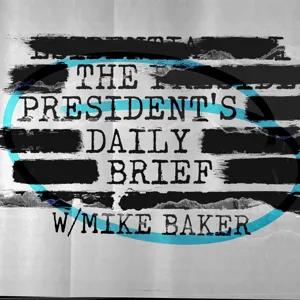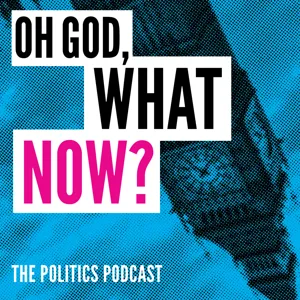Podcast Summary
Israel's shift in policy towards Hamas and Hezbollah: Israel now recognizes the need to address Hamas' control in Gaza and Hezbollah's presence in southern Lebanon, which could lead to wider regional conflict, and the international community is debating potential solutions.
The ongoing conflict between Israel and Hamas in the second month has significant regional implications. The Israeli government now realizes that their previous policy of "mowing the grass" in terms of conflict with Hamas and other groups, while resisting negotiations for a Palestinian state, has collapsed. This shift in paradigm means they cannot tolerate Hamas' control in Gaza and Hezbollah's presence in southern Lebanon, which has been a violation of UN Resolution 1701 since 2006. The international community is now debating potential solutions, as the Israeli government's intolerance of these situations may lead to wider regional conflict. Sir John Jenkins, a former British ambassador and author of a recent essay in The New Statesman, discusses these issues and Iran's involvement in the conflict in more detail.
Hezbollah and Iran's Calculated Actions Towards Israel: Despite increased tensions, Hezbollah and Iran are practicing strategic patience to avoid a major conflict with Israel and the US, while maintaining their objective of challenging Israeli presence and influence in the Middle East.
The situation in the Middle East, particularly between Israel and its neighbors like Hezbollah, Iran, and their respective proxies, remains complex and volatile. Hezbollah's attacks on the Israeli border have increased, and they seem to be calibrating their actions based on Israeli responses to avoid an all-out conflict, given the devastating consequences of the 2006 war between Israel and Lebanon. The Iranians, who have long seen Israel's destruction as a strategic objective, are practicing strategic patience and avoiding direct confrontation with Israel and the US, who have military presence in the region. The link between these groups, including Hamas and Shia militias in Iraq and Syria, is their shared objective of challenging Israeli presence and influence in the region. While there's a general desire to avoid a major regional conflict, miscalculations and misunderstandings can lead to unintended escalations. The key players' judgments and actions will be crucial in managing this volatile situation.
Iran's support for militant groups in the Middle East: Iran's long-term support of militant groups like Hezbollah, Iraqi militias, and the Houthis allows them to project force and advance Iran's interests, despite their varying motivations and trajectories. Transfer of advanced missile technology empowers them to hit targets across the region, contributing to regional tensions.
Iran has been supporting various militant groups in the Middle East, including Hezbollah in Lebanon, Iraqi militias, and the Houthis in Yemen, for decades. This support, which includes training, equipment transfers, and funding, allows these groups to project force in the region and advance Iran's interests, both defensively and offensively. These groups, while sharing a common ideology, have different trajectories and motivations. For instance, Hezbollah's close ties with Iran are historically rooted, while some Iraqi militias are more independent. The Houthis represent a different strand of Shi'ism and have developed close links with Tehran and the IRGC. The transfer of sophisticated missile technology to these groups enables them to hit targets at long distances across the region. While the ultimate goal of these groups is the destruction of Israel, their actions are also influenced by domestic politics and the desire to be useful to Iran. The recent tensions and disagreements between these groups and other countries, such as Saudi Arabia and Israel, are likely to continue shaping the conflict in the region.
Iran's ideological drivers underestimated or misunderstood: The belief in the return of the 12th imam and the destruction of Israel significantly influences Iran's regime and its actions, but this aspect is often overlooked in the Western world due to a focus on secular rationality.
The ideological drivers of Iran's regime, specifically the belief in the return of the 12th imam and the destruction of Israel, are often underestimated or misunderstood in the Western world. This belief holds significant symbolic importance for these groups and plays a powerful role in mobilizing them. The Western perspective, with its strong emphasis on secular rationality, can make it difficult to fully comprehend this aspect of Iran's ideology. This misunderstanding may have contributed to a shift in Western perception of Iran from an expansionist revolutionary regime to a more pragmatic one, potentially overlooking the continued presence and influence of these deeply held beliefs.
Understanding Religious Ideologies and their Role in Middle Eastern Politics: Recognizing the symbolic world of Middle Eastern actors, including their religious beliefs, is essential to understanding and resolving conflicts in the region. Iran's long-term strategy involves asserting secular hegemony and weakening US and Israeli interests through apocalyptic visions and historical challenges to Islamic legitimacy.
The complexities of religious ideologies and their role in shaping modern political conflicts, particularly in the Middle East, cannot be underestimated. The speaker emphasizes the importance of understanding the symbolic world of actors in the region, as seen in the case of Ayatollah Khomeini's claim to interpret the will of the hidden imam, which was essential to the legitimacy of his rule in Iran. The long-term strategy of Iran is to assert secular hegemony over the Middle East and exercise legitimate leadership over the Muslim world by weakening the interests of the United States and Israel. This requires interpreting the religious mindset when it is applied to politics and recognizing the apocalyptic visions that drive certain actors' actions. The speaker also highlights the historical significance of these beliefs and their impact on the present day. For instance, Khomeini's claim to a direct line to the imam challenged the historical notion that governments in Shia communities were not Islamically legitimate without the imam's presence. Overall, the speaker argues that bridging the gap between Western and Middle Eastern mindsets is crucial for understanding and resolving conflicts in the region.
Iran's Aspiration to Lead and the Challenges it Faces: Iran aspires to lead the Muslim world and 'wretched of the earth', but the US and Israel stand as major obstacles. The regime's belief in its divine right complicates negotiations, as does Hamas's shared millenarian mindset.
The Iranian regime, as envisioned by Ayatollah Khomeini, aspires to lead not just the Shia Muslim world but also the broader Muslim community and the "wretched of the earth." This belief is rooted in Iran's geographical position, demographic weight, and status as the only full Shia state. However, the United States and Israel stand as major obstacles to this goal. The Iranian regime views these countries as foreign intruders and believes their existence is not justified. This belief structure complicates political negotiations, such as those regarding nuclear deals, as the Iranian regime sees its ultimate destiny as inevitable. Hamas, another key player in the region, shares this millenarian mindset and continues to pursue conflict with Israel despite offers of truces. Negotiating with a regime that believes in its own divine right to rule and the inevitable realization of its goals presents significant challenges.
Israeli and Iranian approaches to Middle East conflicts differ significantly: Israel focuses on tactical advances, Iran and Hamas seek long-term destruction of Israel, Iran's inflexibility makes peaceful solutions difficult
The Israeli and Iranian approaches to the ongoing conflicts in the Middle East differ significantly. While Israel focuses on making tactical advances and assessing the situation day by day, Iran and Hamas have a long-term vision, which includes the eventual destruction of Israel. The Iranian regime, under the leadership of Khamenei, has become a vanguardist, praetorian state that is committed to its fundamental beliefs and has successfully suppressed dissenting voices. This inflexibility makes it difficult to negotiate or find peaceful solutions to conflicts. The current moment in the Middle East, marked by ongoing crises and reforms in countries like Iran and Saudi Arabia, underscores the importance of understanding these deep-rooted differences and the challenges they pose to finding lasting peace in the region.
Saudi Arabia's role in Israeli-Palestinian conflict resolution: Saudi Arabia recognizes the importance of a Palestinian state for regional peace and stability, and normalization with Israel could be a step towards its establishment. However, resolving the conflict requires addressing Iran, Hezbollah, and the need for competent political leadership.
The ongoing conflict between Israel and Palestine is a major cause of instability and unease in the Middle East and Muslim world. Saudi Arabia, a significant player in the region, has come to understand this and sees the establishment of a Palestinian state as crucial for reducing conflict and promoting social and economic ambitions. The Israeli-Saudi normalization process, which may lead to a Palestinian state, is an important step towards resolving this long-standing issue. However, it's not a solution to all problems in the region, including those related to Iran and Hezbollah. The end of the conflict and the arrangements that follow will be crucial in determining the future of the Palestinians and the broader Middle East. The lack of competent and inspiring political leadership in Israel and the United States may complicate the process, but it's essential to address this issue to promote peace and stability in the region.
The Middle East's Influence on Global Powers: Understanding the Middle East's complex dynamics is crucial for global powers seeking to navigate the international stage effectively.
The Middle East maintains a significant influence on global powers, despite the frequent shift in focus towards other regions. As Sir John Jenkins noted, the Middle East holds a great deal of interest for external powers, and this has remained consistent throughout history. Despite the ongoing discussions about a pivot to Asia, the Middle East continues to play a crucial role in global politics and economics. This is a reminder that understanding the complex dynamics of the Middle East is essential for any global power seeking to navigate the international stage effectively. Additionally, the podcast episode featured recommendations for upgrading your style with Quince and securing comprehensive health coverage with UnitedHealthcare's Health ProtectorGuard plans.





